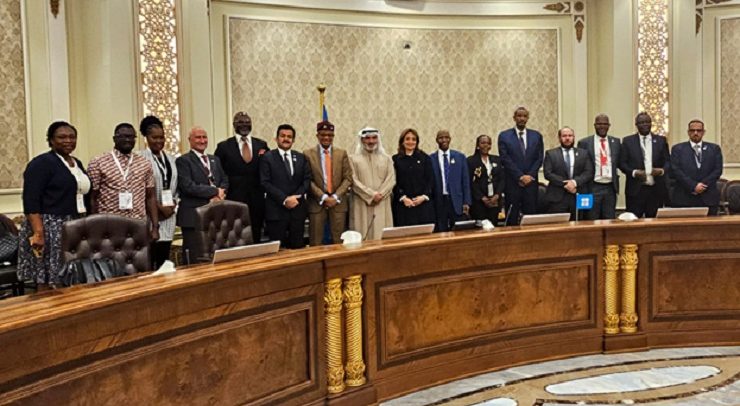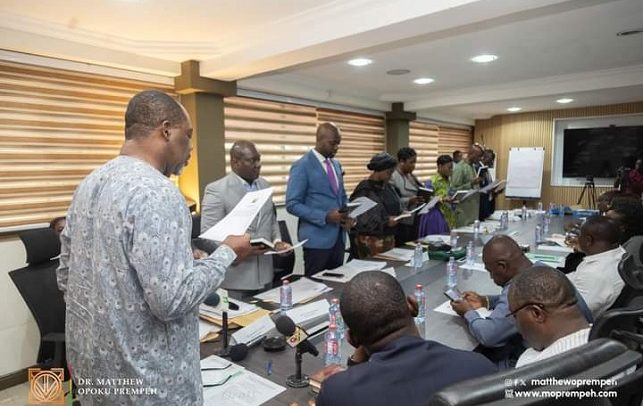
By Edward KUDITEY
Energy transition refers to a significant shift from fossil-based energy production and consumption. Fuel fossil contributes to about 80% of the global energy mix and about 60% of Ghana’s. Therefore, an energy transition is a major structural change to energy supply and consumption in an energy system.
It is an energy system transformation and requires a broad shift in technologies and behaviours to replace one energy source with another. A prime example is the change from a pre-industrial system relying on traditional biomass, wind, water, and muscle power to an industrial system characterized by pervasive mechanization, steam power, and the use of coal. After the 1973 oil crisis, the term energy transition was coined by politicians and media.
It was popularised by US President Jimmy Carter in his 1977 Address on the Nation on Energy, calling to look back into history to understand our energy problem. The term was later globalised after the 1979 second oil shock, during the 1981 United Nations Conference on New and Renewable Sources of Energy.
Currently, the transition primarily involves moving away from fossil fuels (like coal, oil, and natural gas) towards renewable energy sources (such as wind, solar, and hydroelectric power) to reduce greenhouse gas emissions and sustainably combat climate change. Several factors drive this transition phenomenon:
-
- Environmental concerns: Reducing carbon emissions to mitigate climate change.
- Economic factors: The decreasing cost of renewable energy technologies.
- Technological advancements: Improvements in energy storage and grid management.
- Policy and regulation: Government initiatives and international agreements like the Paris Agreement.
Historically, energy transitions have occurred before, such as the shift from wood to coal during the Industrial Revolution, etc. The current energy transition aims to create a more sustainable and resilient energy system for the future. Currently, a transition to sustainable energy, mainly renewable energy, is underway to limit the detrimental impacts of climate change caused by anthropogenic emissions.
Studies have shown that over three-quarters of the world’s energy needs are met by burning fossil fuels, but this usage emits greenhouse gases. Energy production and consumption are responsible for most human-caused greenhouse gas emissions. To meet the goals of the 2015 Paris Agreement on climate change, emissions must be reduced as soon as possible and reach net-zero by mid-century.
Since the late 2010s, the need for energy transition has led to a renewable energy drive, leading to a decreasing cost for both solar and wind power. The energy transition also has the potential to reduce the health and environmental impacts from emissions in the energy industry.
Ghana is a signatory to the Paris Agreement and its actively working on meeting its energy transition commitments in achieving a sustainable energy and transport sector. The country has developed a comprehensive National Energy Transition Framework outlining its goals and strategies for reducing greenhouse gas emissions and increasing renewable energy sources. Key aspects of Ghana’s energy transition include:
- Increase in renewable energy capacity: Ghana aims to significantly increase its renewable energy capacity, targeting 21GW of renewable energy from about 1.7GW by 2070. This includes investments in solar, wind, and hydroelectric power.
- Diversify and secure energy supply: The framework also emphasizes the conversion of liquid fuel fired thermal plants to natural gas fired plants, and the integration of nuclear energy to ensure a diversified and secured energy supply.
- Adoption of electric vehicles and clean cooking: Ghana is promoting the adoption of electric vehicles and clean cooking technologies to reduce emissions from the transportation and household sectors.
- Implementation of carbon capture and storage: The country plans to implement carbon capture and storage technologies to mitigate emissions from industrial processes.
- Economic Opportunities: Ghana is looking to exploit its natural resources, such as lithium, to support the production of batteries and other green technologies.
Ghana’s transition plan is designed to be inclusive and equitable, ensuring that all regions and communities benefit from the shift to a cleaner energy system. The government has also set up the National Energy Transition Implementation Committee to oversee the execution of this framework.
It is worth mentioning that Ghana’s ambitious Energy Transition Plan not only aims to reduce emissions but also to create new job opportunities and improve public health by reducing air pollution.
In light of environmental degradation, climate change, resource depletion, and persistent global poverty, the procurement profession is increasingly being called upon to contribute to broader organisational goals of sustainable development through the inclusion of social and environmental criteria within procurement processes.
United Nations announced 17 Sustainable Development Goals (SDGs) in September 2015, including no hunger, quality education and health, clean energy and economic growth, sustainable cities and communities, climate action, responsible consumption and production, and life on land. In the accomplishment of these SDGs, procurement in sustainable ways is very crucial.
The Public Procurement Act, 2003 (Act 663), particularly in Section 2, has been amended in the Public Procurement Amendment Act, 2016 (Act 914) to include Environmental and social sustainability considerations in the award of public procurement contracts.
These amendments further strengthen the Country’s commitment to the phenomenon of Energy Transition. Sustainable procurement can be defined as the pursuit of sustainable development objectives through the purchasing and supply process. It refers to the act of integrating a concern for broader social and environmental impacts within procurement undertaken by government or public sector bodies.
The energy transition in Ghana has several procurement implications, particularly in terms of how energy projects are sourced, financed, and managed. The procurement strategy should particularly focus on some of these key considerations:
- Increased Demand for Renewable Energy Technologies: As Ghana shifts towards renewable energy sources like solar, wind, and hydro, there will be a higher demand for procurement of these technologies. This includes not only the equipment but also the expertise and services required for installation and maintenance.
- Power Purchase Agreements (PPAs): The transition involves renegotiating existing PPAs and establishing new ones that are more transparent and competitive. Historically, Ghana has faced challenges with non-competitive PPAs that led to higher costs and financial strain. Moving forward, there will be a need for more transparent and competitive procurement processes to ensure cost-effectiveness and sustainability.
- Investment in Infrastructure: Significant investments will be required to upgrade and expand the energy infrastructure to accommodate new renewable energy projects. This includes grid modernization, energy storage solutions, and smart grid technologies.
- Capacity Building and Local Content: There will be a focus on building local capacity and ensuring that a significant portion of the energy transition driven procurement benefits local businesses and the workforce. This includes training programs and policies that promote local content and local participation in energy projects.
- Financial and Regulatory Frameworks: The transition will necessitate robust financial and regulatory frameworks to attract investment and manage risks. This includes creating favorable conditions for private sector participation and ensuring regulatory stability.
- Sustainability and Environmental Standards: Procurement processes will need to incorporate sustainability and environmental standards to ensure that new projects align with Ghana’s environmental goals and commitments.
In conclusion, the energy transition in Ghana presents both challenges and opportunities in the procurement space. It requires a strategic approach to ensure that the transition is cost-effective, sustainable, and beneficial to the economy and society.
Procurement professionals are required to take bold and decisive actions to eliminate waste from their supply chains and make a difference in ensuring sustainability in the practice of procurement in a way that considers the environmental, social, and economic impacts throughout the procurement life cycle.
By adopting sustainable procurement practices, organizations can not only reduce their environmental impact but also enhance their reputation, comply with regulatory requirements, and contribute to overall societal well-being.
Top of FormBottom of FormEdward is a Chartered Procurement Professional with 20 years of proven professional experience in procurement and supply chain management.
He is currently a Doctoral Candidate at SBS/NIBS.
[email protected] or 233244750237
The post The phenomenon of energy transition: implication on sustainable procurement in the oil and gas industry appeared first on The Business & Financial Times.
Read Full Story











Facebook
Twitter
Pinterest
Instagram
Google+
YouTube
LinkedIn
RSS